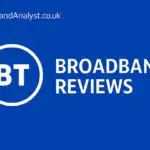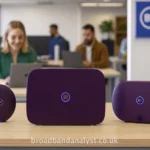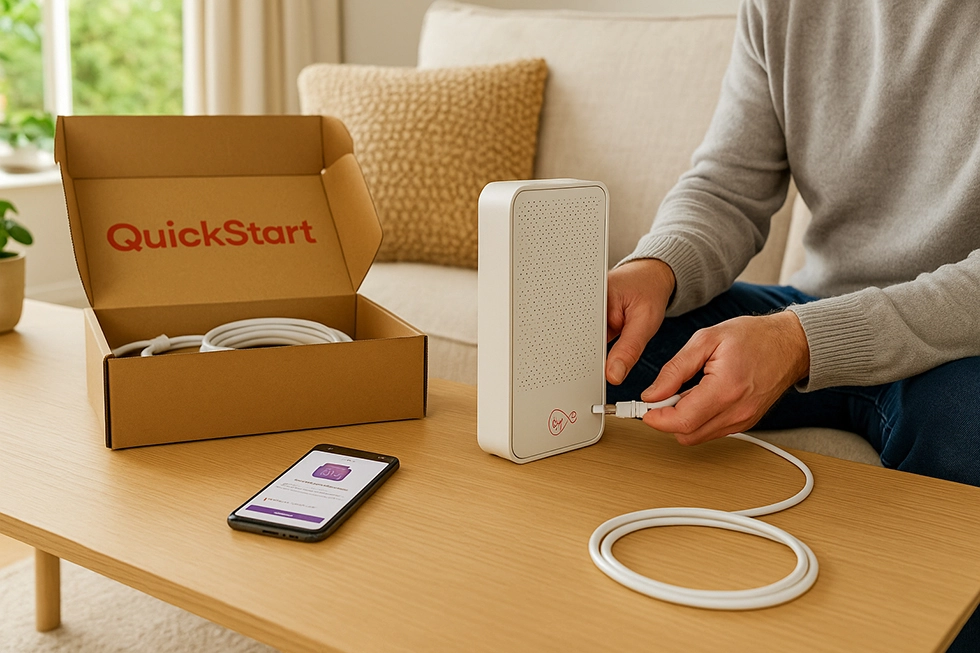BT Full Fibre 300 Broadband Review
BT Full Fibre 300 is a mid-tier package in BT’s fibre line-up, delivering fast enough speeds for busy households at a lower monthly cost than gigabit plans. But does this mid-tier option deliver genuine value, or are you better off looking elsewhere?
In this comprehensive review, we examine every aspect of BT Full Fibre 300, from real-world performance to customer service experiences, helping you decide if it’s the right broadband choice for your home.
Today’s Offer
| Plan | Speed | Price | |
|---|---|---|---|
 Full Fibre 300 Full Fibre 30024 month contract |
300Mb avg |
£30.99 / month £371.88 / year More details |
 |
| FTTP. Free Setup. Includes £85 Reward Card. Offer ends 29th January. |
What Is BT Full Fibre 300?
BT Full Fibre 300 is a fibre-to-the-premises (FTTP) broadband package delivering average download speeds of 300Mbps and upload speeds of up to 49Mbps. Unlike older fibre-to-the-cabinet connections that mix fibre optic cables with copper wiring for the final stretch to your home, Full Fibre 300 uses fibre optic technology all the way to your property. This eliminates the signal degradation and speed loss associated with copper cables, resulting in faster, more reliable connectivity.
The package is ideal for medium to large households with multiple users who need bandwidth for simultaneous streaming, gaming, video calls, and general internet use. BT suggests the plan supports up to 10 connected devices comfortably, though in practice, modern households with smart home devices, tablets, phones, laptops, and streaming devices often exceed this number without noticeable performance issues.
BT Full Fibre 300 operates on the Openreach network, the UK's largest fibre infrastructure provider. As Openreach is technically part of the BT Group, BT customers often benefit from priority access to new full fibre rollouts and engineer appointments. The package includes BT's Smart Hub 2 router as standard, unlimited data with no usage caps or throttling, and BT's Stay Fast Guarantee, which promises minimum speeds and compensation if performance falls below guaranteed thresholds.
Speed Performance: Download, Upload, and Latency
BT Full Fibre 300 broadband plan offers average download speeds of 300Mbps. Independent testing confirms that BT consistently delivers on this promise. According to Ofcom's UK Home Broadband Performance data, BT's Full Fibre 300 package achieved real-world 24-hour average speeds of 304.22Mbps, actually exceeding the advertised rate. This performance consistency places BT among the better performers in the UK market for delivering advertised speeds.
| Advertised download speed | 300 Mbps |
| Real-world 24-hour average | 304.22 Mbps |
| Upload speed | Up to 49 Mbps |
| Latency (avg) | 6.93 ms |
| Peak-time performance (8–10 pm) | Typically 250 Mbps |
| 50 GB download time | 22 minutes |
| Simultaneous 4K streams | Up to 12 |
The 300Mbps download speed translates to practical performance that handles demanding tasks with ease. You can download a 50GB game in approximately 22 minutes, stream multiple 4K videos simultaneously across different devices, and handle large file transfers for work without noticeable delays. For context, Netflix recommends 25Mbps for 4K streaming, meaning Full Fibre 300 could theoretically support 12 simultaneous 4K streams before experiencing buffering.
Upload speeds reach up to 49Mbps, which represents a significant improvement over BT's older FTTC connections that typically maxed out at 10-20Mbps uploads. The 49Mbps upload capability matters most for video conferencing, uploading large files to cloud storage, live streaming, and online gaming where upload bandwidth affects in-game voice chat and gameplay responsiveness. However, it's worth noting that 49Mbps uploads fall short of truly symmetrical connections offered by some alternative network providers, where upload speeds match download speeds.
Latency performance on BT Full Fibre 300 impresses, averaging around 6.93 milliseconds according to Ofcom testing. Low latency is crucial for responsive online gaming, smooth video calls, and any application requiring real-time interaction. For competitive gamers, this latency figure puts BT Full Fibre 300 in the excellent category, with minimal lag between your actions and server responses. The consistent latency also benefits remote workers on frequent video calls, reducing the awkward delays and talking-over-each-other moments that plague higher-latency connections.
During peak evening hours between 8pm and 10pm when network congestion typically occurs, BT Full Fibre 300 maintains performance well. The fibre-to-the-premises technology means your connection doesn't share bandwidth with neighbouring properties in the same way older cable or FTTC connections do. While some minor speed variations occur during absolute peak times, most users report speeds remaining above 250Mbps even when the entire neighbourhood is online simultaneously.
Pricing and Value for Money
BT Full Fibre 300 typically costs from £30.99 per month depending on promotional offers and whether you're a new customer or renewing. The most commonly advertised price for new customers sits around £30.99-£32.99 monthly on a 24-month contract, though this introductory rate is subject to annual price increases.
BT includes a £9.99 postage and packaging charge for sending out the Smart Hub 2 router and installation kit. However, promotional periods frequently waive this fee, bringing the total upfront cost to £0. When setup fees are waived, you can get connected to Full Fibre 300 without any initial payment beyond your first month's bill.
Annual price increases represent a significant consideration when evaluating long-term value. BT implements price rises every April, typically adding £3 per month to your bill during your contract term. For a contract signed in October 2025, you'll experience one price increase in April 2026 and another in April 2027. This means a package starting at £32 monthly effectively costs an average of £34 monthly over the full 24-month term once you factor in these increases.
Compared to BT's other packages, Full Fibre 300 offers a compelling middle ground. BT Full Fibre 150 costs just £2–3 less than Full Fibre 300, despite offering half the download speed. The modest price difference makes Full Fibre 300 better value unless budget constraints are paramount. Conversely, BT Full Fibre 500 typically costs only £3–5 more for significantly faster speeds. This pricing structure can make Full Fibre 300 feel squeezed between better-value options above and below it.
Against market competition, BT Full Fibre 300's pricing positions it at the premium end. Alternative network providers like Community Fibre offer 300Mbps packages for approximately £18-20 monthly with no mid-contract price increases. Hyperoptic's equivalent tier costs around £28-30 monthly. Virgin Media's M350 package delivering 362Mbps averages £30-35 monthly. TalkTalk and Vodafone on CityFibre infrastructure often cost £5–10 less per month than BT for similar speeds.
However, BT's pricing reflects additional value beyond raw speed. The package includes BT's extensive customer support infrastructure, widespread engineer availability, the highly-rated Smart Hub 2 router, and various add-on options like Hybrid Connect and whole-home WiFi. For customers who value brand reliability and comprehensive support over absolute cheapest pricing, BT's premium makes sense.
Deals, Offers, and Promotional Incentives
BT regularly runs promotional campaigns that significantly enhance the value proposition of Full Fibre 300. The most common promotion involves BT Reward Cards, prepaid Mastercard gift cards (from £50 to £150) sent to customers several months after signup.
These cards arrive via email approximately 4 months after your service activates, requiring you to click a redemption link and provide delivery information. The reward card functions like a prepaid debit card, usable anywhere Mastercard is accepted online or in stores. However, careful attention to redemption deadlines is essential, as failing to activate your card within the specified timeframe forfeits the entire value.
When factoring in a reward card (for example, £100 reward card), the effective cost of Full Fibre 300 drops significantly. A package costing £32 monthly for 24 months equals £768 total. Subtract the £100 reward card, and your true cost becomes £668, or approximately £27.83 per month. This calculation assumes successful reward card redemption, which requires monitoring your email carefully and responding promptly to redemption instructions.
Setup fee waivers represent another common promotion. While BT normally charges £9.99 for postage and packaging of the router, promotional periods frequently eliminate this charge. Combined with reward cards, you can sometimes secure Full Fibre 300 with £0 upfront costs and £100+ back (reward card) within a few months.
BT occasionally bundles entertainment offers with broadband packages. Promotions have included Xbox Game Pass subscriptions, Norton Security software, BT Cloud storage, or temporary speed upgrades. These extras add value if you would have purchased them separately anyway, though bundled entertainment offers should be evaluated based on your actual usage rather than perceived value.
One notable absence from BT's promotional toolkit is cashback deals. Unlike some competitors who offer straightforward cashback paid directly to your bank account, BT exclusively uses reward cards. While reward cards offer flexibility in spending, they come with expiration dates and redemption requirements that cashback avoids.
Existing BT customers renewing contracts rarely receive the same generous offers as new customers. This industry-standard practice frustrates loyal customers who see better deals advertised to new sign-ups than offered for renewal. However, contacting BT's retention department before your contract expires often unlocks better renewal deals than the automatic renewal terms.
BT Smart Hub 2 Router
Every BT Full Fibre 300 package includes the BT Smart Hub 2, BT's flagship consumer router that's been standard issue since 2018. The Smart Hub 2 earned impressive ratings from consumer testing organization Which?, scoring 88% thanks to strong speed, coverage, and multi-device handling capabilities.
The router delivers dual-band WiFi supporting both 2.4GHz and 5GHz frequencies. The 2.4GHz band offers better range and wall penetration but slower maximum speeds, ideal for smart home devices and areas furthest from the router. The 5GHz band provides faster speeds with less interference from neighbouring WiFi networks but has shorter range, perfect for devices in the same room or nearby rooms requiring maximum bandwidth.
Design-wise, the Smart Hub 2 features a compact, cylindrical shape with a matte finish and minimal LED indicators. The understated aesthetic suits modern homes better than the garish blinking routers of previous generations. Four Gigabit Ethernet ports on the back allow wired connections for devices like gaming consoles, desktop computers, or network-attached storage where maximum speed and reliability matter.
Setup simplicity impresses even non-technical users. The router arrives pre-configured with your BT account details and includes a Quick Start guide. For full fibre connections, you plug the router into power and connect it to the Openreach ONT (optical network terminal) using the provided cable. The router typically establishes connection within 5-10 minutes, and you can begin using your broadband immediately.
The BT Smart Hub app allows smartphone management of your home network. You can view connected devices, pause internet access for specific devices (useful for managing children's screen time), run speed tests, and access basic settings without logging into a web interface. The app isn't as feature-rich as enthusiast routers, but covers essential functions most households need.
However, the Smart Hub 2 shows its age in several respects. Most significantly, it lacks WiFi 6 (802.11ax) support, instead maxing out at WiFi 5 (802.11ac). WiFi 6 offers better performance with multiple devices, improved efficiency, and faster theoretical speeds. As devices increasingly support WiFi 6 as standard, the Smart Hub 2's older technology becomes more limiting. Competitors including Virgin Media, Sky, and several alternative networks now provide WiFi 6 routers, giving them a technical advantage.
The router's range adequately covers average-sized homes but struggles with larger properties or homes with thick walls and multiple floors. BT offers Complete WiFi (formerly BT Whole Home WiFi) as an additional £10 monthly add-on, providing mesh WiFi discs that extend coverage throughout larger homes. While effective, the extra cost rankles when some providers include mesh systems as standard or at minimal additional cost.
Advanced users may find the Smart Hub 2's configuration options limited. While you can change basic settings like WiFi passwords and enable guest networks, advanced features like custom DNS servers, VLANs, or detailed QoS settings either require workarounds or aren't available at all. Enthusiasts often replace the Smart Hub 2 with their own router, though this requires some technical knowledge and may void support for certain BT services.
Customer Service and Support Quality
BT's customer service reputation presents a decidedly mixed picture, with experiences varying dramatically depending on which department you reach and when you call. Understanding what to expect helps set realistic expectations and prepares you for potential challenges.
BT operates multiple customer service channels including phone support, online chat, social media support through Twitter/X, email, and self-service options through the My BT app and website. Phone support operates on 0330 1234 150 (or 150 from BT mobiles) with availability from 7am-10:30pm daily. Technical support and sales teams operate on different numbers, and calling the wrong department can result in transfers and extended hold times.
Customer reviews of BT support paint a challenging picture. On Trustpilot, BT receives an average rating of just 1.2 stars from over 19,000 reviews, with common complaints including long wait times, difficulty reaching competent staff, issues escalating without resolution, and feeling passed between departments without progress. Many reviews specifically mention installation problems, missed engineer appointments, billing errors, and difficulty cancelling services.
Installation experiences particularly divide opinion. When installations proceed smoothly, customers praise engineer professionalism and technical competence. However, numerous reviews describe missed appointments, engineers arriving without necessary equipment, multiple rescheduled installation dates, and communication breakdowns between BT customer service and Openreach engineers. One particularly frustrated customer reported taking three days off work across six months for installations that never happened, eventually being charged increased activation fees after their order was cancelled without notification.
The billing department generates frequent complaints about incorrect charges, difficulty obtaining refunds for acknowledged errors, and confusion when BT applies promotional discounts or reward cards. Some customers report being charged for services they didn't request, discovering additional line rentals they never authorized, or facing resistance when attempting to correct obvious billing mistakes.
However, BT's customer service isn't uniformly poor. According to Ofcom's 2025 Comparing Service Quality report, BT achieved 85% satisfaction with overall service and 85% satisfaction with speed of service, both meeting or exceeding industry averages. Only 20% of BT customers had reason to complain. This data suggests that the majority of customers receive adequate service without major issues.
The My BT app provides helpful self-service diagnostics, letting you run line tests, troubleshoot common issues, and check for network outages without calling support.
For complex or escalated complaints, contacting BT's executive complaints team often achieves better results than standard customer service channels. Writing to BT plc, PO Box 334, Sheffield, S98 1BT or reaching out via social media sometimes connects you with staff empowered to resolve longstanding issues that frontline support couldn't handle.
Reliability and Network Performance
BT's network reliability generally rates highly among UK broadband providers, benefiting from Openreach's extensive infrastructure and ongoing investment in network maintenance and upgrades.
Full fibre connections inherently offer better reliability than older technologies. FTTP connections aren't affected by weather conditions, electrical interference, or distance from cabinets the way copper-based connections are. This translates to consistent speeds regardless of time of day, fewer dropouts during storms, and generally stable connectivity.
Independent monitoring suggests BT full fibre services experience minimal downtime. While occasional outages occur due to equipment failures, network maintenance, or physical damage to infrastructure, these incidents affect smaller geographic areas and are typically resolved within hours rather than days. BT's extensive engineer network means fault repairs usually happen quickly compared to smaller providers with limited field staff.
The Stay Fast Guarantee provides additional assurance. BT promises minimum speeds for Full Fibre 300, typically guaranteeing at least 150Mbps even during peak times. If your speeds consistently fall below this threshold and BT cannot resolve the issue within 30 days, you gain the right to exit your contract early without penalty. Previously, BT offered £100 compensation if they failed to maintain guaranteed speeds, though this has been reduced to £20 in current contracts.
BT Halo and Add-On Options
BT offers several optional add-ons to enhance your Full Fibre 300 package, with BT Halo representing the flagship premium option.
BT Halo (around £10-15 monthly extra) bundles several features designed to improve reliability and customer experience. The headline feature is Hybrid Connect, a 4G backup system that automatically switches your connection to EE's mobile network if your fixed-line broadband fails. The Hybrid Connect device plugs into your Smart Hub and maintains internet connectivity during outages, keeping you online for activities like work-from-home video calls or accessing essential online services.
Hybrid Connect provides genuine peace of mind for remote workers or anyone who cannot tolerate connectivity interruptions. However, the 4G backup operates at reduced speeds compared to your full fibre connection, typically 10-30Mbps depending on local mobile signal strength. This suffices for video calls and light usage but won't match your normal 300Mbps experience.
Additional Halo benefits include free repairs for in-home wiring issues that would normally incur charges, priority customer service access, and a Keep Your Number feature that lets you switch broadband providers without losing your mobile number if you also have BT Mobile. For households where connectivity interruption has serious consequences, Halo's extra cost might justify itself. For typical users, the backup connectivity rarely gets used enough to warrant the monthly expense.
Complete WiFi (previously BT Whole Home WiFi) costs around £10 monthly and adds mesh WiFi discs to extend coverage throughout larger homes. The system includes up to three WiFi discs that communicate with your Smart Hub 2 to create a seamless network covering your entire property. If you experience WiFi dead zones or weak signals in certain rooms with the Smart Hub 2 alone, Complete WiFi effectively addresses this limitation.
However, £10 monthly over a 24-month contract equals £240, enough to purchase a quality third-party mesh WiFi system outright. Many users achieve better coverage at lower long-term cost by investing in their own mesh system rather than subscribing to BT's offering.
Digital Voice (around £5 monthly) provides a home phone service delivered over your broadband connection rather than a traditional copper phone line. For households transitioning from FTTC to full fibre, Digital Voice replaces your old landline as copper infrastructure is gradually retired. The service includes a digital phone adapter, and your existing cordless phones work by connecting to the adapter.
Digital Voice calls use your broadband connection, so call quality depends on your internet stability. During broadband outages without Hybrid Connect backup, your phone service fails too. BT provides basic calling features like voicemail and caller ID, with additional features like call blocking and call waiting available for extra monthly fees.
Entertainment packages through EE TV allow you to add television services to your broadband connection. Options range from basic Entertainment (20+ premium channels including Sky Atlantic and Discovery) through Big Entertainment, Big Sport (TNT Sports), and VIP bundles including Sky Cinema. Prices range from promotional rates of £1 monthly initially to £20-40 monthly ongoing depending on the package.
TV bundles make sense if you specifically want the channels offered and find better value in bundling than subscribing separately. However, for viewers primarily using streaming services like Netflix, Disney+, or BBC iPlayer, paying for traditional TV packages you won't watch wastes money even if the bundle discount looks attractive.
What's Good About BT Full Fibre 300?
Several genuine strengths make BT Full Fibre 300 worth considering despite its premium pricing relative to alternatives.
Reliability stands out as a key advantage. BT benefits from the Openreach infrastructure, the UK's most extensive broadband network with the widest coverage, most engineer coverage, and longest operating history. When issues occur, BT generally resolves them quickly thanks to abundant engineering resources. For risk-averse customers who prioritize "it just works" reliability over chasing the absolute cheapest deal, BT's track record provides reassurance.
The Smart Hub 2, despite lacking WiFi 6, genuinely ranks among the better ISP-provided routers. Its strong range, stable performance, and ability to handle numerous simultaneous device connections exceeds many competing routers supplied by other providers. Which?'s 88% rating reflects genuine quality, and most users experience trouble-free operation without needing to upgrade to aftermarket routers.
Consistent speed delivery impresses, with real-world performance matching or exceeding advertised speeds. Ofcom testing showing 304Mbps average speeds against a 300Mbps advertising claim demonstrates BT's honest marketing and well-managed network. You're unlikely to experience the dramatic gaps between advertised and delivered speeds that plague some providers.
The Stay Fast Guarantee provides valuable consumer protection. Knowing you can exit penalty-free if speeds fall below minimums and aren't resolved gives you leverage that not all providers offer. While you hope never to need this protection, having it matters when things go wrong.
Availability advantages BT customers. Openreach's full fibre rollout reaches around 17 million UK premises with plans to cover 25 million by 2026, representing roughly two-thirds of UK homes currently. If you live somewhere full fibre is available at all, BT will almost certainly be among your options. Alternative networks like Hyperoptic or Community Fibre remain limited to specific urban areas.
Customer support, despite its mixed reputation, benefits from multiple access channels and 7am-10:30pm availability seven days weekly. While experiences vary, having multiple ways to reach support and extended hours beats providers with limited contact hours or email-only support.
Low latency matters for gaming and real-time applications. The 6.93ms average latency puts BT Full Fibre 300 in the excellent category for competitive online gaming, video conferencing, or any application requiring minimal delay between action and response.
Flexible add-ons let you customize your service. Hybrid Connect backup for reliability-critical users, Complete WiFi for larger homes, and TV bundles for entertainment needs allow personalizing your package beyond basic broadband. While these add-ons cost extra, having the option beats providers offering one-size-fits-all packages.
What's Lacking with BT Full Fibre 300?
Despite its strengths, several limitations make BT Full Fibre 300 less appealing than alternatives for cost-conscious or performance-focused customers.
Pricing sits high relative to market competition. Alternative network providers deliver comparable or faster speeds at £10-15 less monthly, and BT's mandatory annual price increases further widen the gap over time. For households on tight budgets, the premium BT charges over alternatives buys you brand recognition and support infrastructure, but those intangibles don't justify the cost for everyone.
Asymmetric upload speeds disappoint. The 49Mbps upload capability improves on older connections but falls short of symmetrical fiber where uploads match downloads. Content creators, remote workers frequently uploading large files, or households with multiple people video calling simultaneously would benefit from the 300Mbps symmetric uploads Community Fibre or Hyperoptic provide versus BT's 49Mbps.
Smart Hub 2's lack of WiFi 6 increasingly matters as more devices support the newer standard. While WiFi 5 functions adequately today, it limits future performance potential. Competitors providing WiFi 6 routers offer better future-proofing without additional equipment upgrades.
Mid-contract price increases of £3 annually mean your monthly bill rises predictably every April. While BT now discloses exact price rise amounts upfront (unlike the unpredictable CPI+percentage formulas of older contracts), watching your bill increase by £3-4 annually still frustrates. Alternative providers like Hyperoptic commit to fixed pricing throughout contracts, eliminating surprise increases.
Customer service inconsistency creates uncertainty. You might reach knowledgeable, helpful staff who resolve your issue efficiently, or you might spend hours on hold navigating transfers between departments without resolution. The unpredictability means you can't confidently expect good service when you need it.
The 24-month contract locks you in for two years. While standard across the industry, the long commitment period limits flexibility if your circumstances change, better deals emerge, or you become dissatisfied with service. Early exit fees equaling remaining monthly payments make leaving expensive.
Limited configuration options frustrate technically-inclined users. The Smart Hub 2 covers basics adequately but doesn't offer advanced features power users want. Having to replace the provided router to access features like custom DNS, VLANs, or detailed QoS settings adds expense and complexity.
Setup fees, even when promotional offers waive them, create an artificial cost that shouldn't exist. Charging £9.99 to post a router feels petty, and having to watch for promotional periods to avoid this charge adds friction to the signup process.
Reward cards require effort to redeem and come with expiration dates. Unlike straightforward cashback credited to your bank account, reward cards demand you remember to check email months after signing up, click redemption links within specified windows, and use the card before it expires. This activation friction means some customers forfeit value they theoretically received.
Coverage gaps persist despite Openreach's extensive network. Rural areas and some suburban neighborhoods still lack full fibre access, limiting who can even consider Full Fibre 300. While BT's coverage leads among national providers, regional altnets sometimes reach specific streets Openreach hasn't yet upgraded.
Comparing Alternatives to BT Full Fibre 300
Several competitors deserve consideration before committing to BT Full Fibre 300.
Community Fibre (London-focused) offers 300Mbps symmetrical speeds for approximately £18-20 monthly on 24-month contracts with no setup fees. The dramatic price advantage saves roughly £300-350 over two years compared to BT. Community Fibre provides symmetrical uploads, excellent customer service ratings, and no mid-contract price increases beyond £2 annually. The primary limitation is coverage restricted mainly to London, though expansion continues into surrounding areas.
Hyperoptic delivers similar 300Mbps-tier speeds for around £28-30 monthly in areas they serve. While more expensive than Community Fibre, Hyperoptic undercuts BT by several pounds monthly and offers symmetrical uploads. Hyperoptic also provides no mid-contract price increases and offers one-month rolling contracts for maximum flexibility. Coverage concentrates on London and other major cities, particularly apartment buildings and new developments.
Virgin Media M350 delivers 362Mbps downloads on their cable network for typically £30-35 monthly. Virgin Media's cable technology offers faster downloads than BT Full Fibre 300 but slower uploads (around 36Mbps). Virgin Media's Super Hub router receives mixed reviews, though it supports WiFi 6. Virgin Media frequently waives setup fees and offers competitive promotional pricing. Their network covers roughly 15 million UK premises, providing a viable alternative where available.
Sky Full fibre 150 delivers speeds up to 145Mbps for around £28-30 monthly on Openreach infrastructure. While slower than BT Full Fibre 300, Sky's Sky Q router impresses, and their customer service consistently ranks among the UK's best. For households not needing full 300Mbps speeds, Sky offers better value at lower speeds with superior support experiences.
TalkTalk and Vodafone on CityFibre infrastructure deliver 300Mbps-900Mbps speeds for £25-35 monthly in CityFibre-served areas. These partnerships between national brands and alternative infrastructure provide competitive pricing with broader brand recognition than purely altnet providers. CityFibre's network passes approximately 3.6 million homes currently with aggressive expansion plans.
Zen Internet, though more expensive at £35-40 monthly for similar speeds, provides exceptional customer service with UK-based support consistently rated among the industry's best. For customers prioritizing support quality above all else and willing to pay extra, Zen delivers reassurance that BT's customer service inconsistency cannot match.
Within BT's own lineup, Full Fibre 150 at £29.99-£32.99 monthly costs only £2-3 less for half the speed, making Full Fibre 300 better value unless budget absolutely cannot stretch. Conversely, Full Fibre 500 at £35-37 monthly offers 500Mbps downloads for just £3-5 more, delivering significantly faster speeds for a modest premium that often makes it the smarter choice if you're already considering Full Fibre 300.
Is BT Full Fibre 300 Any Good?
BT Full Fibre 300 represents a competent, reliable mid-tier broadband option that delivers exactly what it promises: consistent 300Mbps speeds, low latency, and unlimited data backed by the UK's most extensive broadband infrastructure.
For certain customer profiles, BT Full Fibre 300 makes excellent sense. If you value brand recognition and the reassurance that comes with using the UK's most established broadband provider, BT's premium pricing buys you peace of mind. If you need Openreach's extensive coverage because alternative networks haven't reached your area, BT often represents your best or only full fibre option. If you want the flexibility to add premium features like Hybrid Connect backup or comprehensive TV packages, BT's ecosystem provides options smaller providers cannot match.
However, for cost-conscious households willing to look beyond big-brand recognition, alternative network providers deliver comparable or superior performance at significantly lower prices. Community Fibre, Hyperoptic, and CityFibre-based providers undercut BT by £10-15 monthly while often providing symmetrical upload speeds BT cannot match. The £240-360 you'd save over 24 months with an altnet provider represents real money that could fund other household needs or simply remain in your pocket.
The package particularly struggles to justify itself for tech-savvy users who will immediately replace the Smart Hub 2 anyway, cost-conscious customers for whom every pound matters, content creators needing symmetrical uploads, or anyone dissatisfied with BT's customer service reputation. In these scenarios, looking at Community Fibre, Hyperoptic, or other alternatives almost always reveals better value.
Verdict: Reliable but Premium-Priced
BT Full Fibre 300 delivers reliable, consistent performance backed by the UK's most extensive broadband infrastructure and a genuinely good router. Speeds consistently meet or exceed advertised rates, latency impresses gamers and remote workers, and the unlimited data never throttles or caps your usage.
However, the premium pricing relative to alternative providers makes it difficult to recommend BT Full Fibre 300 unreservedly. Unless you specifically value BT's brand reputation, need coverage alternatives cannot provide, or want add-on options like Hybrid Connect backup, you'll almost certainly find better value elsewhere.
For those committed to BT, Full Fibre 300 sits awkwardly positioned between Full Fibre 150 (only marginally cheaper for half the speed) and Full Fibre 500 (only marginally more expensive for dramatically faster speeds). If your budget allows, consider stretching to Full Fibre 500 for better long-term value. If budget is tight, alternative providers deliver equivalent speeds for £10-15 less monthly.
Rating: 3.9 out of 5 stars
BT Full Fibre 300 earns solid marks for reliability, performance, and technical capability. However, premium pricing relative to market alternatives and customer service inconsistency prevent it from achieving top ratings. It's a good broadband package that's simply not the best value available in October 2025's competitive market.
Best for: Customers who value brand recognition, need Openreach's extensive coverage, want flexibility to add premium features, or prioritise reliability over absolute lowest cost.
Not ideal for: Cost-conscious households, content creators needing symmetrical uploads, tech enthusiasts wanting WiFi 6, or anyone prioritizing customer service quality above all else.







